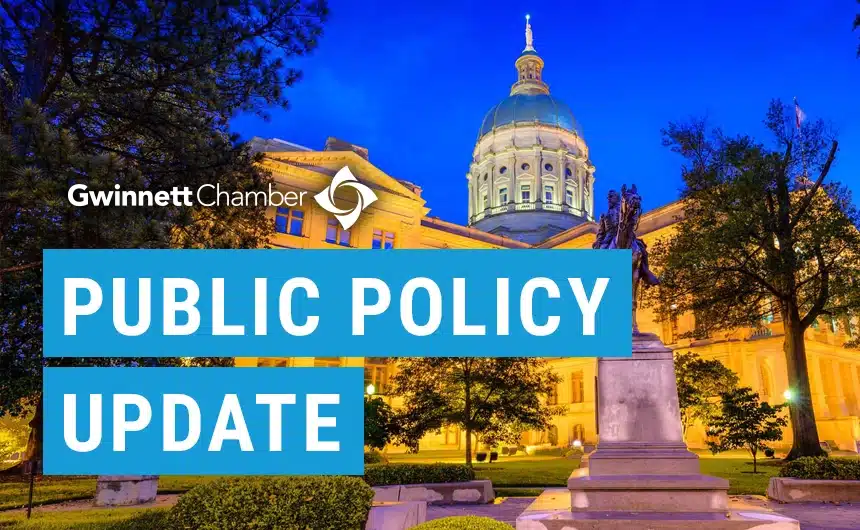The 2023 Legislative Session came to an end on Wednesday (technically, Thursday morning) as lawmakers voted on bills past midnight. Governor Brian Kemp has until May 8 to sign or veto bills. If no action is taken, the bills that passed become law on their effective date. Bills that did not get a vote this session are still up for consideration next legislative session.
Budget
The House and Senate-appointed Conference Committee Members worked out differences in the FY24 budget (HB 19). Leaders agreed to a $6000 increase in law enforcement staffers like state troopers while others would receive $4000. The $32.4 billion budget includes funding for the Metropolitan North Georgia Water Planning District, gives a $2000 pay increase to state and university employees, and fully funds HOPE scholarship as requested by the Governor.
Governor’s bills
HB 128, sponsored by Rep. Soo Hong (Governor’s Floor Leader), would increase the representation of businesses owned by minorities, women, and veterans in the procurement of state contracts for construction, services, equipment, and goods. The bill passed in the House 160-3 and in the Senate 44-1 and awaits the Governor’s signature.
SB 42, sponsored by Sen. Mike Hodges (Governor’s Floor Leader), would increase the fines for businesses that fail to comply with model notice requirements for the human trafficking hotline. The bill passed in the Senate 51-1 and unanimously passed in the House and awaits the Governor’s signature.
Other notable bills
HB 30, sponsored by Rep. John Carson and co-sponsored by Majority Leader Chuck Efstration, would create a state definition of antisemitism in Georgia and would require state agencies and departments to consider discriminatory intent in investigations. The bill refers to the International Holocaust Remembrance Alliance’s definition of antisemitism. This bill is complimentary to the Hate Crimes legislation that was passed and signed into law in 2020. This bill ended up being tabled in the Senate after changes to the bill’s language. Senators stripped the language in HB 144 and replaced it with the contents of HB 30. It was favorably reported in the Senate Children and Families Committee. The bill was tabled by the Senate on Monday and was not called for a vote on Wednesday.
SB 93, sponsored by Senate Majority Caucus Chairman Jason Anavitarte would prohibit a state employee from installing or using a social media platform that is controlled or influenced by a foreign adversary recognized by the GEMA on state equipment. The bill would also require GEMA to maintain and update a list of foreign adversaries. The House unanimously passed by substitute, which the Senate unanimously agreed to, and now heads to the Governor’s desk.
HB 189, sponsored by Rep. Steven Meeks, would increase the weight variance of trucks carrying agricultural and forestry products from 5% to 10% (88,000 lbs). The sunset date is July 1, 2025. The Senate passed the bill on Thursday 44-5 by substitute. A Conference Committee was appointed late in the night to work out a compromise and the measure passed out of both chambers.
HB 406, sponsored by Rep. Rick Jasperse, would create regulations for electric vehicle chargers. Although this bill did not pass, the companion bill in the Senate, SB 146, sponsored by Sen. Steve Gooch, passed out of the House by substitute 175-1 and the Senate agreed.
HB 408, sponsored by Rep. Bruce Williamson, would extend the sales tax exemption for major economic development projects of regional significance to 2026. The bill passed in the Senate 43-6 and heads to the Governor’s desk.
HB 514, sponsored by Rep. Dale Washburn, would limit local moratoriums on new residential development to 180 days and gives exceptions during emergency situations. One of the amendments added in the Senate committee changed the moratoriums to apply to all types of housing. A conference committee was appointed on Wednesday to work out the differences but the bill never received a vote before the end of session.
SR 85, sponsored by Sen. Larry Walker, would create the Senate Occupational Licensing Study Committee to address Georgia’s current occupational licensing laws and requirements. Senate passed the resolution 43-1 on Monday.
SR 275, sponsored by Sen. John Albers, would create the Senate Study Committee on Expanding Georgia’s Workforce to review current programs and initiatives to strengthen workforce opportunities. Senate passed the resolution 43-1 on Monday.
To learn more about the Chamber’s public policy initiatives, visit https://gwinnettchamber.org/publicpolicy/

